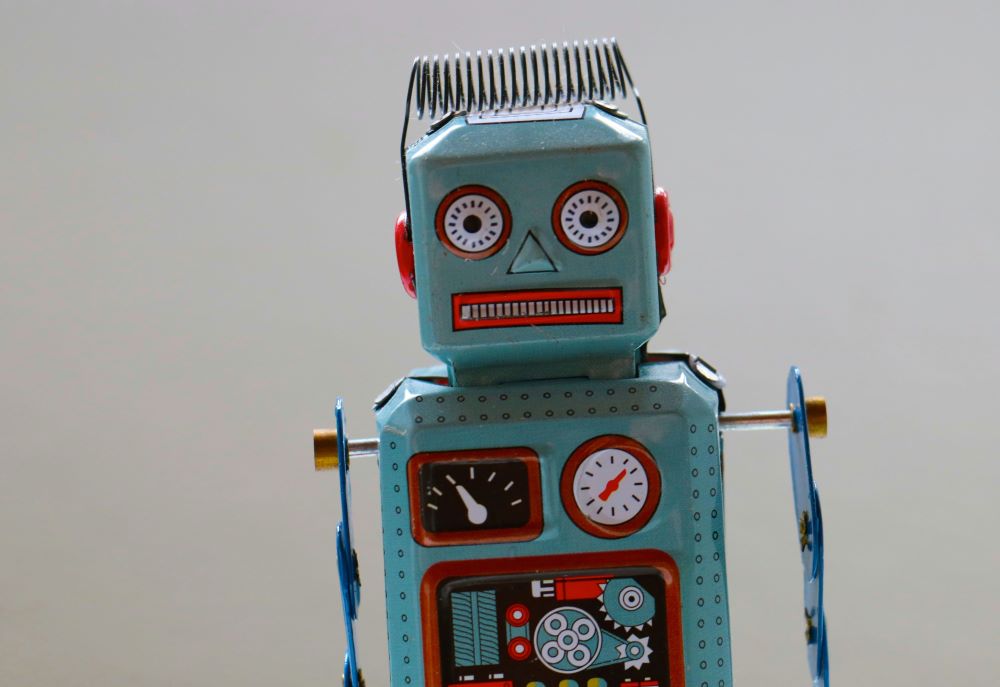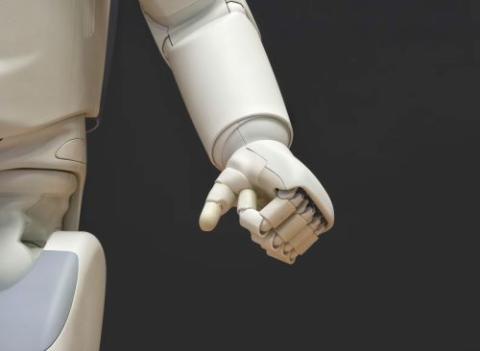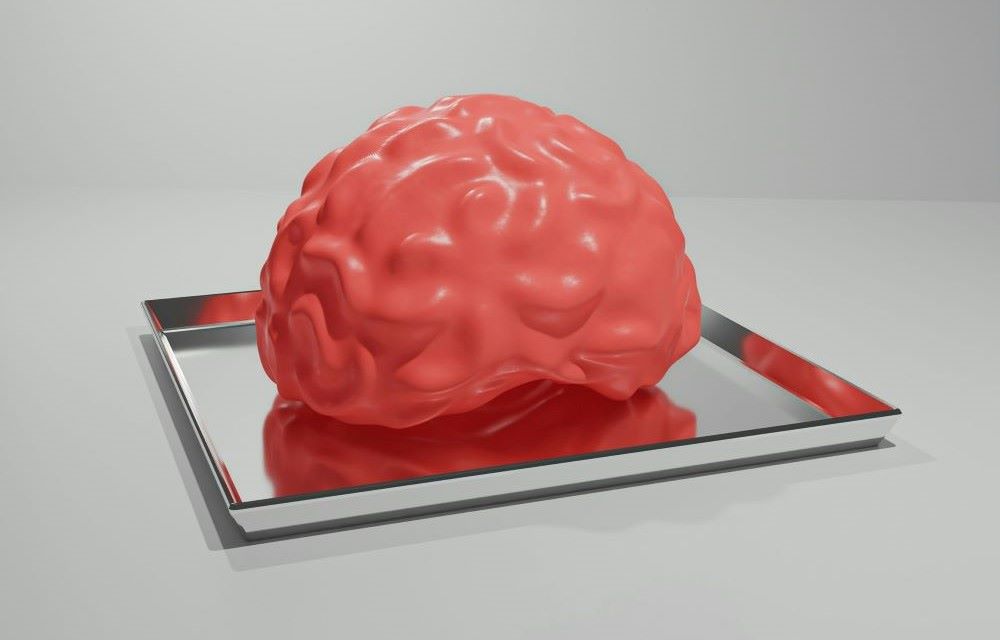
(Unsplash/Emilipothèse)
Donald Trump first ran for president in 2016. You'll likely remember that.
What you may not recall is the rival candidacy of atheist philosopher Zoltan Istvan, whose Transhumanist Party platform promised overcoming "human death and aging in 15-20 years." Istvan toured the country in the "Immortality Bus" — a vintage RV tricked out as a brown coffin — to promote his belief that "people have a universal right to live indefinitely through science."
Istvan's fringe candidacy failed. His agenda, however, is far from fringe in the tech world. Its admirers and adherents include leading engineers and executives helming some of the world's wealthiest and most powerful companies, whose products are firmly baked into our everyday lives, and whose cultural influence is immense.
Their visions and inventions raise fundamental questions about how we understand ourselves as human beings and our hopes for our ultimate end. For Catholics, however, answers to these questions were provided at an event that commenced 1,700 years ago this May: the Council of Nicaea, at which more than 300 assembled bishops affirmed that Jesus is fully God, and fully human.
This council rejected claims that Jesus was something less than God. It also dismissed lingering "gnostic" beliefs that Jesus was something other than human, and whose having a body was of little consequence. In this gnostic worldview, physical bodies weren't worth redeeming or saving; instead, they were prisons from which to liberate mind and spirit.
To gnostics, as Joseph Vukov of Loyola University Chicago puts it, "matter doesn't matter." This was true in ancient times, and it's evident today in Silicon Valley's "transhumanist" efforts to enhance, replace or simply dispense with the human body to achieve immortality. With just the right innovations, true believers insist, we can manage to live forever — body or no body.
Transhumanism's rise presents Christians with an urgent opportunity to offer an alternative worldview: one centered upon a different Lord, and a different understanding of human beings. One that relies on grace, not tech.
Seeds of this modern gnosticism are on full display with biohacking influencers like Bryan Johnson, the lapsed Mormon centi-millionaire tech entrepreneur whose public campaign to reverse aging has garnered over 1 million YouTube followers, prime media coverage and a Netflix documentary titled, fittingly, "Don't Die: The Man Who Wants to Live Forever."
While Johnson jokes about starting a cult, he's serious when touting on X his "spiritual" and "religious" protocol for immortality as superior to Christianity: "Jesus fed bread and alcohol, impairing and aging. I will feed you nutrients that awake and create life." Forget the "bread of life," Johnson urges Christians. He's selling — with apologies to St. Paul — a "more excellent way."
Beyond "optimizing" bodies to extend life indefinitely, as Johnson proposes, another approach seeks to dispense with bodies altogether by scanning and copying brains and uploading memories and consciousnesses into the cloud for "digital immortality." After that, a mind might exist perpetually as an avatar in the metaverse, or be downloaded into a robot.
One enthusiast for this option is Sam Altman, the celebrity CEO of ChatGPT's parent company, OpenAI. He's made a downpayment with an organization that's received a nearly $1 million U.S. government grant: Nectome, which aims to embalm brains for scanning and digitizing at a later date. "I assume my brain will be uploaded to the cloud," Altman happily predicts.
But there's only one catch: He'll have to be euthanized first. "The user experience will be identical to physician-assisted suicide," a Nectome spokesperson explains. It's "100 percent fatal." In short, Altman is willing to die so that he can live forever. In a perverse way, that statement sounds almost Christian. Yet nothing could be farther from the truth.
Altman's OpenAI co-founder and frenemy Elon Musk concedes that one day brains might be downloaded into robots, and his Neuralink company seeks ways to store brains' memories for future use. Musk himself doesn't want to do it; he says it's "weird." But the singer Grimes, mother of three of Musk's 12 kids, is pretty sure that Amazon founder Jeff Bezos would. (Bezos has not publicly said he would do so.)

(Unsplash/Possessed Photography)
Musk's PayPal co-founder, venture capitalist Peter Thiel, has his own plans. This mentor to Altman and Vice President JD Vance will be cryogenically frozen by the Alcor Life Extension Foundation for whatever tech possibilities the future holds. Unlike Nectome, team Alcor doesn't help you die. They just swoop in when you're about to. Which is risky because if they're late — the brain starts to decay.
Then there's Ray Kurzweil, Google's "principal researcher and AI visionary." This engineer, inventor and author has received major awards from three U.S. presidents. Humans don't really need bodies, he argues, as there's no real difference between the digital and physical worlds. He enthusiastically predicts we're close to "transcending our biology" and will merge with AI by 2045.
Sound far-fetched? Not according to Microsoft founder Bill Gates. "Ray Kurzweil is the best person I know at predicting the future of Artificial Intelligence," he said when endorsing Kurzweil's latest book.
In seeking to defeat death and redefine the human condition, these technologists aim to make us something other than human. "posthuman," in their lingo. Their willingness to discard the body in pursuing digital immortality is frightening to many, and smacks of hubris. It's for good reason that Pope Francis warned against "the excessive pretensions of science and technology."
Such pretensions led Francis to lament, in Laudato Si', a "technocracy … which sees no special value in human beings." To thwart this, he called for global regulatory norms to "prevent unacceptable actions," and invited "resistance to the assault of the technocratic paradigm," including "boycotting certain products." ("W)hat is at stake," he stressed, "is our own dignity."

(Unsplash/Ibrahim Jonathan)
Yet while troubling technocratic trends invite pushback, they can also elicit sympathy for their evangelists who, as Loyola Chicago's Vukov observes, "are united … in their shared fear of and obsession with death." The prospect of annihilation drives their innovation in an ultimately futile quest: "Those who would save their life," says Jesus in Matthew's Gospel, "will lose it."
Being transhumanist, according to presidential hopeful Istvan, "requires something happening to you." Such as, for him, almost stepping on a landmine. With Kurzweil, it was his father's untimely death. And Thiel's drive to "cure" death began at age 3 when his taciturn father insisted that everything dies — just like the cow whose hide made the rug he sat on.
Their experiences and fears led these individuals, and others like them, to embrace transhumanism, described as Silicon Valley's religion. For transhumanists, to borrow from Laudato Si', tech enjoys "lordship over all." In fleeing death, they're pursuing an unending digital dystopia in which bodies are simply outmoded shells to be replaced or discarded.
Transhumanism's rise presents Christians with an urgent opportunity to offer an alternative worldview: one centered upon a different Lord, and a different understanding of human beings. One that relies on grace, not tech. One that doesn't flee from what we are, but embraces what we hope to become. One that honors our bodies. One offered to us by the Council of Nicaea.
Advertisement
That council rebutted claims that Jesus would only seem to have a body, if he were indeed God. And it refuted arguments that Jesus certainly wasn't God, if in fact he had a body. Instead, the council decreed, Jesus is fully God and fully human, from which it follows that bodies are integral to human nature and foundational to human dignity — teaching as relevant today as it was then.
Bodies are not machines that carry out an imprisoned mind's commands. They're essential to being human, which is why we honor Jesus, God's incarnate Son, as the "Word made flesh." In his body, Jesus died and rose to "free those who through fear of death had been subject to slavery all their life" and offer hope for immortality — not in a metaverse, but in an eternal embrace of love.
God didn't assume human nature in Jesus of Nazareth that we might become avatars or robots. Instead, in the astonishing words of the Catechism of the Catholic Church, "The Son of God became man so that we might become God." While technologists may chase "optimization," Christians journey toward "divinization." The differences, and the choice, are stark.
Facing the challenges of what Pope Leo XVI has labeled "disruptive technological innovations," the Council of Nicaea's 1,700th anniversary gives us a truth to celebrate, and a hope to share. And it's an opportunity that arrives not a moment too soon.
Because Zoltan Istavan of the Immortality Bus is running for president again in 2028.





